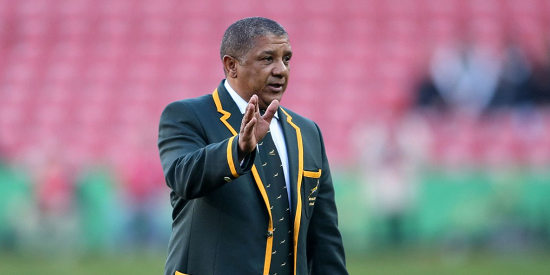After the disaster of losing eight games in a row, comes the opportunity to change. But who’s brave enough to do it? Here’s a way forward for a game that has a long way to go to get back to where it once was.
Allister Coetzee and Adriaan Strauss expressed deep disappointment at outcome of @CastleLagerSA outgoing tour… https://t.co/xxJod1rB51 pic.twitter.com/bRrmdVexDn
— South African Rugby (@Springboks) November 28, 2016
We have all no doubt pondered the reasons we find ourselves in this malaise. Having spent a fair amount of time doing exactly that, I wonder if we as a country might have embraced the professional rugby era better had we not won the 1995 Rugby World Cup?
Weird, I know, but bear with me.
As days go, they do not come much more glorious than June 24th, 1995, proving beyond doubt that sport has the power to unify. But did winning it so soon after being welcomed back into the international fold, make us arrogant enough to think our structures at the time would suffice?
For a myriad of reasons, the playing field has now changed completely. The sport is brutally divided sport on so many fronts. I think we missed the chance to restructure in order to truly embrace the professional game that the 1995 World Cup ushered in.
Perhaps because of the arrogance of then SARU president Louis Luyt, perhaps to avoid addressing the racial divide, perhaps because we had become so adept at running our own show, given the Apartheid-enforced ostracism at the time?
Or perhaps the money coming into the game started fuelling a gravy train overloaded with people looking to serve themselves rather than the game?
Whatever the cause, one of the biggest challenges facing the game in SA right now, is our amateur era infrastructure falling apart in the face of professional era demands.
With Springbok rugby now in the embarrassing state that it is, and quite obviously in need of time in the ICU, we cannot miss this enforced period of navel gazing to make not only superficial changes on the player and coaching personnel front, but also structurally.
So we have this brave new world, requiring brave new calls, but do we have the brave new people in place to make the calls and implement the plans?
There are many theories about how to implement change. But SA Rugby could do a lot worse than making use of change management guru, John Kotter’s eight-step change process that he introduced in his book, “Leading Change.”
Step 1 – Create a Sense of Urgency
Step 2 – Build a Guiding Coalition
Step 3 – Form a Strategic Vision and Initiatives
Step 4 – Enlist a Volunteer Army
Step 5 – Enable Action by Removing Barriers
Step 6 – Generate Short-Term Wins
Step 7 – Sustain Acceleration
Step 8 – Institute Change
If losing eight games in a season for a 33% win record has not created a sense of urgency, then nothing will. People know we need change, which provides SARU with a significant opportunity.
Three biggies stand out for me:
The head coach. Legendary Man United manager Alex Ferguson, who turned down the England job twice during his career, believes a national coach should be of a senior age, successful in his own right, and not in need of the salary. Does Allister Coetzee perhaps want the job too much? Did he accept the job too easily and thus not on his own terms?
Continuity of coaching. There are plenty of player academies in South Africa, but where is the plan to develop coaches? Five of the six SA Super Rugby franchise head coaches were new to the job this year. When last did a Springbok coach get picked out of the previous regime’s assistant coaching staff? Every change in the guard is seemingly panic stricken instead of part of a strategic plan.
Pandering to players. Yes they are the cornerstone on which the sport is built, but is there a business on earth that has survived paying their employees more than the revenue they generate? In trying to compete with player salaries offered overseas, that is exactly what we are doing in SA Rugby. The sport is writing cheques it simply cannot cash. What are we doing offering Craven Week players contracts worth more than some New Zealand Super Rugby contracts? Why try and compete with European salaries?
Here’s hoping that an overhaul of SA rugby’s governing and administrative infrastructure, bringing it into line with other professionally run sports bodies round the world, will see change to these more delicate matters, along an emergence of talented people equipped to run rugby in this brave new world.
Yes, it’s a mess. Yes, we need change. Yes, it’s an opportunity.
* This article first appeared on the Change Exchange, an online platform by BrightRock, provider of the first-ever life insurance that changes as your life changes. The opinions expressed in this piece are the writer’s own and don’t necessarily reflect the views of BrightRock.

Leave a Reply